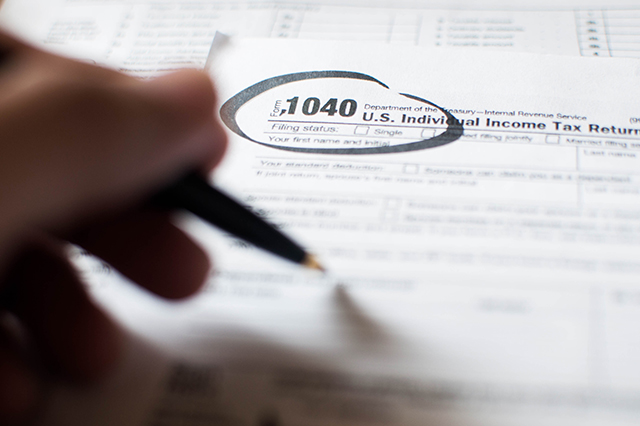Tax season can be stressful. After navigating through all the jargon and rules, the hope is to simply avoid owing the government money if possible and maximize your return.
Generally, the best way to owe less in taxes is to make smart financial decisions through thoughtful self-evaluation, keeping records and planning.
1. Get Rewarded for Giving
Making a charitable donation can be rewarding in multiple ways. Whether you donated money, clothes, toys, food or household items, if you gave to a good cause, deductible donations could reduce your tax bill.
“Ingredients for casseroles you regularly prepare for a qualified nonprofit organization’s soup kitchen…or the cost of stamps you buy for your school’s fundraiser count as a charitable contribution,” according to TurboTax. “If you drove your car for charity in 2019, remember to deduct 14 cents per mile.”
To make sure your donations qualify, give to legitimate charities (you can use sites like Charity Navigator or Charity Watch to check) and get a receipt.
2. Record Medical Expenses
If you visited the doctor often or received some expensive dental care this year, you could have more deductions. Generally, qualified medical expenses can be deducted if they’re more than 10% of the tax year’s adjusted gross income.
This means if a person’s AGI is $38,000, anything over the first $3,800 of their medical bills could become deductibles. Since an average hospital stay can cost $10,000, the odds of going over that 10% is likely. Again, keeping receipts is a must.
3. Invest in a 401k or FSA
Some employers offer benefits like a 401(k) or flexible spending account. Both can affect tax bills because they deal with untaxed funds.
By automatically transferring money from a paycheck, 401(k)s — which aren’t taxed until they’re withdrawn — help people save for retirement. Should their occupation change, a 401(k) can be rolled into an individual retirement account, and income taxes still won’t be due until later.
An FSA works by taking money from income as well, but these funds must be used for medical, dental or eye care during the calendar year. Everyday health items like bandages, vitamins, pregnancy test kits, breast pumps and acupuncture are also eligible.
4. Save With an IRA
An IRA can also help you save for post-work life and reduce your tax bill. When saving with a traditional IRA, contributions are pre-tax. Since your total income will be lower, you’ll owe less income taxes. The IRA contribution limit for 2019 is $6,000 ($7,000 if you’re 50 or older). However, not everyone is eligible to deduct these contributions and, like a 401(k), taxes apply later.
Regarding a Roth IRA, or if you are converting from a traditional, you’ll pay taxes now, but funds will be tax-free later. Converting in steps, over a few years, is better to avoid being bumped into a higher tax bracket.
Keep in mind that if you plan to sign up for Medicare within two years, be wary making large conversions. “You’ll have to pay extra for Medicare Part B if your [AGI] (plus tax-exempt interest income) is more than $85,000 [single] or $170,000 [married filing jointly],” according to Kiplinger.

5. Clean up Your Portfolio
Many people choose to invest in stocks to try to make and save money. If a stock isn’t doing well, you can consider selling it.
“You can deduct losses on stock sales, which can offset any taxable capital gains you might have,” according to NerdWallet. “The limit on that offset is $3,000, or $1,500 for married couples filing separately.”
Just be aware that you can’t buy the same or similar stock 30 days before or after its sale. Otherwise, the deduction isn’t allowed.
6. Meet With a Professional
If you find the terminology and abbreviations (like IRA, 401(k), FSA, etc.) confusing or experienced a change in your financial situation during the past year, you may want to consult with a professional prior to tax time.
Taxes, deductions and itemizing can be complicated, but you can talk to a tax adviser to make sure you’re not paying more than you have to and are saving as much as you can.
7. Use Credit Cards Wisely
When used responsibly, credit cards can be a tool for improving finances. Credit cards are more secure than debit cards and help build your credit — which makes big purchases easier in the future. What’s more, many credit cards allow holders to earn cash back — anywhere from 1 to 6 percent — that can go right into savings.
8. Scrutinize Your Expenses
When it comes to saving money, small changes in your everyday routine can make a big difference. Focus on your needs rather than wants. Make food and drinks at home rather than ordering out and/or cut down on entertainment. Reread your insurance policies and cell phone plans to see if they’re still worthwhile; rates are always changing, so shop around for potential deals or call your current provider to ask about savings directly.
9. Save First
Saving money isn’t always easy, but following a few self-set rules could help.
Only saving “what’s left” at the end of a paycheck isn’t conducive to building a savings account. Having a specific amount of money you save from each paycheck or every month helps. If it makes it easier, you can also choose to set up automatic transfers. Once you’ve put away your savings, pretend it doesn’t exist. The idea is simple – if you don’t have money, you won’t be tempted to spend it.
If you get a raise/bonus, start a side hustle or receive tax return, put it right into savings. Should you need to feel the fruits of your labor to avoid running out of steam, put at least half into savings and treat yourself occasionally.
How do you save at tax time? Tell us in the comments!














